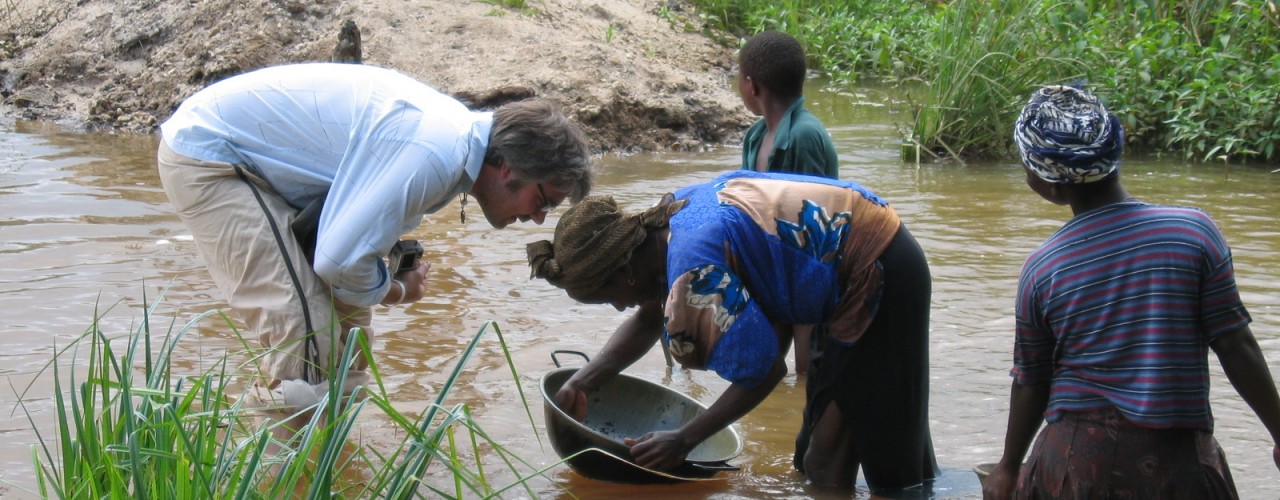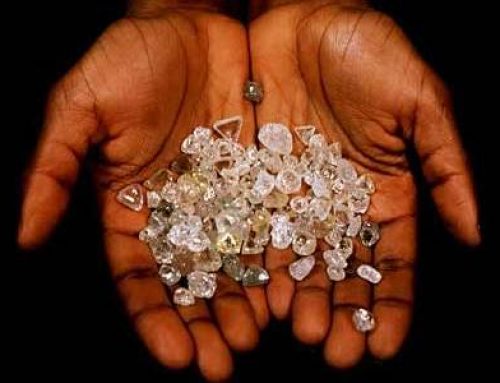If diamonds were potatoes we would all have burnt our fingers to a crisp long ago. I confess this article will not read well if you are invested into diamonds purely as a dealer. Diamonds are a human rights issue in their own right and given the rapid decline in the credibility of the Kimberley Process (KPC) in the last 12 months they will undoubtedly continue to be one. Let me explain.
Firstly let’s start at source. It has been said many times over the years, small-scale miners make up the overwhelming majority of people employed in the mining sector.
More than a million African artisanal diamond diggers and their families live and work in absolute poverty, outside the formal economy, in countries struggling to recover from the ravages of war. Diamond Development Initiative.
I have witnessed this truth in recent months as I have begun a new phase of my journey in jewellery through establishing in partnership with Fairtrade Africa a cooperative movement amongst artisan miners.  A elderly man with a prosthetic limb came up to me on a recent trip to Sierra Leone, shook my hand and asked if I would educate his grandchildren in the way of peace so that war never returned to his country. The historical conflicts in Sierra Leone, Angola, Cote D’Ivoire or currently DR Congo and Zimbabwe are real and continue to have a devastating impact on the lives of the poor, their communities and the infrastructure of those countries. Diamonds, as we all know, have been a very real driver in prolonging those conflicts. The tragedy of war is the legacy of ruined generations and 10 years of a KPC does not mean everything is now ok.
A elderly man with a prosthetic limb came up to me on a recent trip to Sierra Leone, shook my hand and asked if I would educate his grandchildren in the way of peace so that war never returned to his country. The historical conflicts in Sierra Leone, Angola, Cote D’Ivoire or currently DR Congo and Zimbabwe are real and continue to have a devastating impact on the lives of the poor, their communities and the infrastructure of those countries. Diamonds, as we all know, have been a very real driver in prolonging those conflicts. The tragedy of war is the legacy of ruined generations and 10 years of a KPC does not mean everything is now ok.
Historically these conflict stones have enriched us all and not a penny has ever been paid in reparations by the traders who greedily enriched themselves on the backs of these conflicts. This is why certain sections of the diamond industry who now so proudly boast about their founding support for the Kimberley Process face such a moral dilemma. To call for the reinstatement of Zimbabwe diamond exports under the auspices of the KPC is to deny the very founding principles of KPC and is clear hypocrisy. One senior member of the diamond fraternal is on record as saying at the 34th World Diamond Congress in 2010
These very same miners and citizens have been imprisoned, gun shipped off the diamond fields, illegally detained and tortured in secret camps. As a jeweller the question I have to ask myself is; “Do I want such a diamond in my shop?” Obviously the answer to that question is NO.
The Kimberley Process and Zimbabwe.
“Miners, retailers, and consumers have relied on the Kimberley Process to stop blood diamonds from being sold, but with Chairman Yamba’s decision, the KP has betrayed their trust,” said Arvind Ganesan, business and human rights director at Human Rights Watch. “Governments and companies should ignore his decision unless they want to make blood diamonds available to consumers and ruin the credibility of the Kimberley Process as well.” Human Rights Watch
These blood diamonds as the August BBC Panorama programme aired and Human Rights Watch have shown, continue to be stones that enrich elites, persecute the poor, suppress and censor the voice of truth and systemically abuse human rights. It would seem therefore that there is a clash of values at the very core of the diamond story that manifests itself in the question; ‘What is more important, Human Rights or making money at any price?’ I am the first to admit that these two ideas are not mutually exclusive, yet in the heavily politicised diamond world, agreement is hard come by and confusion abounds.
And it is here that I am critical of The World Diamond Council, the body established to act as the Governance framework for the KPC. Firstly they welcome the legal export of stones from Marange in 2010. Then in less than 6 months cautiously re-welcomes the introduction of exports from Marange, but asks members to apply due diligence on all stones coming from Marange. Yet the fact remains that the human rights abuses in the diamond fields of Zimbabwe have led the KPC into utter confusion and division. The International Diamond Manufacturers Association alongside The Responsible Jewellery Council have all shown a distinct lack of principled leadership in their vacillation over whether Zimbabwe should be included or excluded from KPC. It would appear as if all their press releases were written by lawyers. I have to be honest, given the huge body of evidence of bloody abuses and blood split in the Marange region, it should not be a difficult decision. Zimbabwe out!
We need a Kimberley Process that has international credibility and the tragedy is that Kimberley has become a discredited system and everyone in the industry knows it is not working. Equally this vacuum of strategic leadership means the civil society and campaign groups are rightly becoming more vocal about the veracity of the claims about ethics and conflict being spun by the industry. Here are some of my suggestions on how the KPC can begin to restore its credibility;
1. Need a full time secretariat for KPC that is representative of all stakeholders.
2. It needs to be properly funded by the Diamond Industry.
3. Human rights abuses need to be included in its terms of reference as a reason to be excluded from the process.
4. The KPC monitor (independent of the secretariat) needs to be 100% fully independent and have no political or financial interests in Diamond Companies.
5. Cutting and Polishing should be included in the process, so that there is a full, accountable and transparent supply chain from mine to retail.
6. Representatives of alluvial diamond diggers should have a permanent seat on the secretariat to ensure the voice of the majority.
7. The process should be directly accountable to the United Nations.
This may well lead to a smaller, leaner, fit for purpose Kimberley Process, but I believe it would mean a process that the international community can have greater faith in. Also it will mean the industry would know which countries it can do business with and those it cannot.
 The diamond brand as sold to the consumer is the icon of luxury, aspiration and purity. We talk of flawless perfection being forged in the ancient fires of volcanic activity and we seek to immortalise our commitments of love in this rock of compressed carbon. Yet its public image is like all things in the world of politics not its reality and substance. We have allowed for commercial reasons only the intentional divorce between product and ethics and as such are now paying the price in the slow erosion of the diamond brand. For my part I would have the diamond become the new symbol of the upholding of international human rights and the promotion of peace. It may just be the redemptive angle the diamond industry has been looking for.
The diamond brand as sold to the consumer is the icon of luxury, aspiration and purity. We talk of flawless perfection being forged in the ancient fires of volcanic activity and we seek to immortalise our commitments of love in this rock of compressed carbon. Yet its public image is like all things in the world of politics not its reality and substance. We have allowed for commercial reasons only the intentional divorce between product and ethics and as such are now paying the price in the slow erosion of the diamond brand. For my part I would have the diamond become the new symbol of the upholding of international human rights and the promotion of peace. It may just be the redemptive angle the diamond industry has been looking for.







Hi Greg. Decent piece, and I agree with most of your ideas for reform. But those industry declarations were a response to the KP’s internal politics–in particular, the chairman deciding exports should proceed, in the absence of an agreement. Currently, there is no consensus on Zim exports, and Marange exports are still considered blocked, as they have been for two years, with the exception of three shipments. In addition, the NGOs have in fact called for a resolution to the Zimbabwe issue, which would mean resolution of at least some exports from Marange. (http://www.globalwitness.org/library/conflict-diamond-scheme-must-resolve-zimbabwe-impasse) Most people want a deal, just to get this off the KP’s plate; the difference is what terms are involved.
HI Greg,
Really interesting reading, thanks for the info and your insight. Invaluable to jewellers like me.
Zoe.
Hi Greg
Great article. Well done
Richard Hartmann
Galway, Ireland